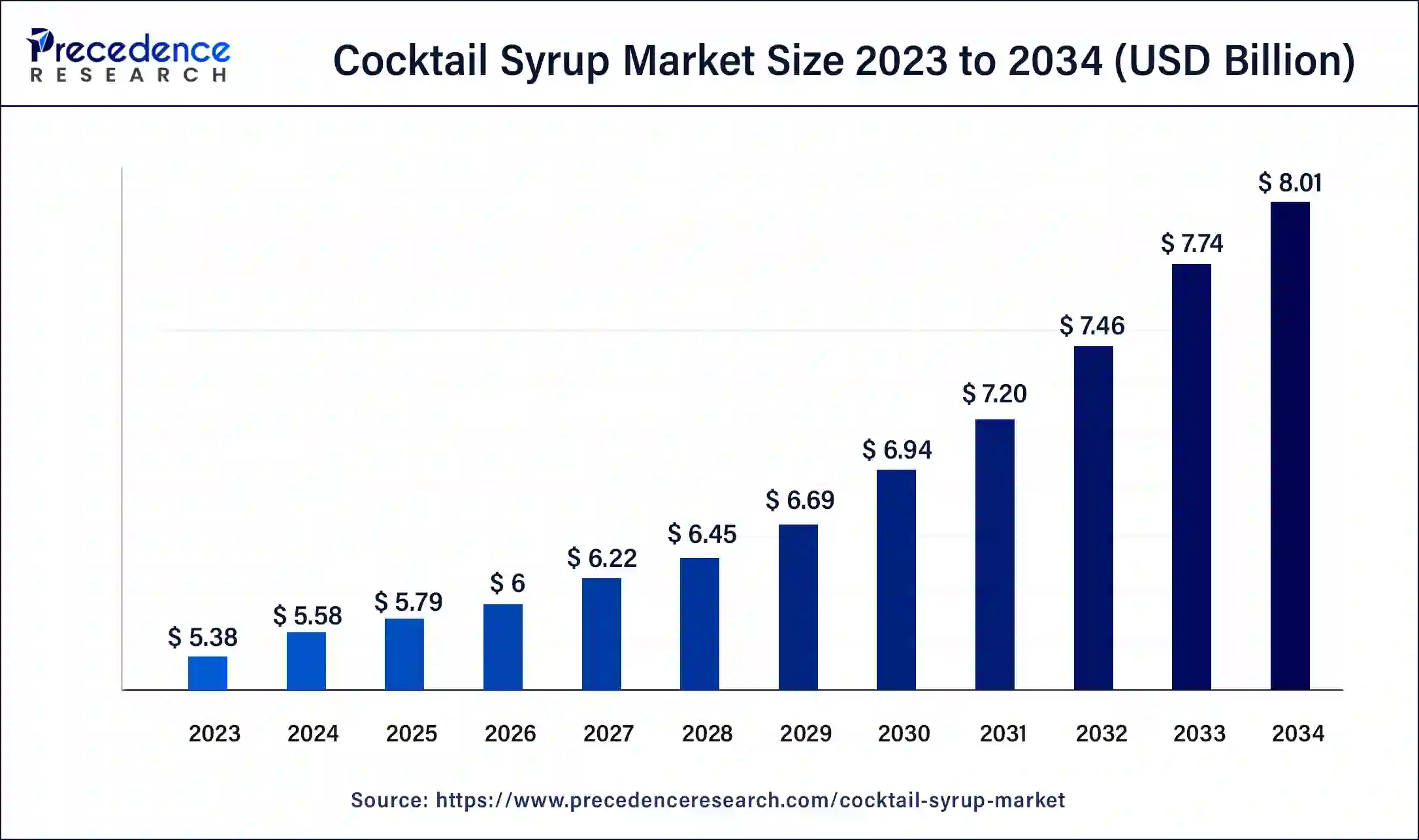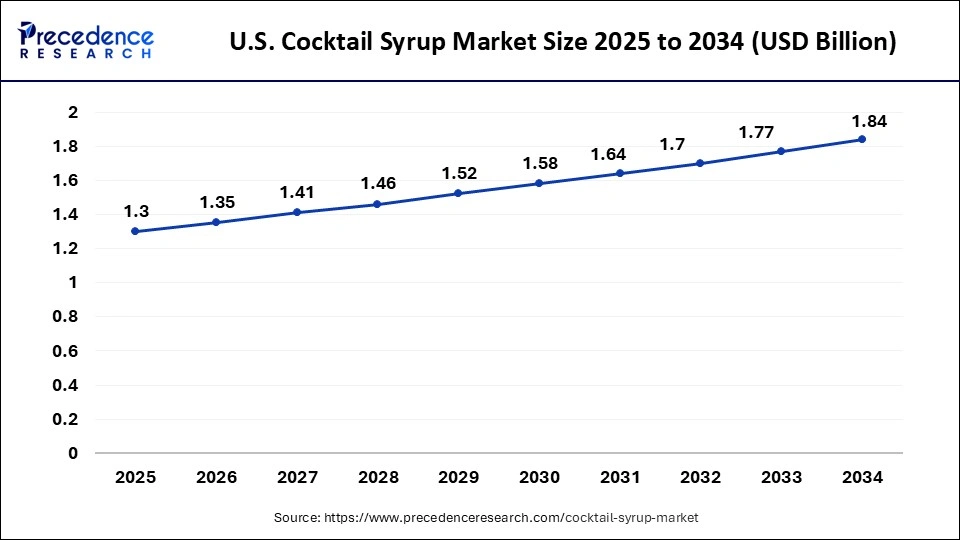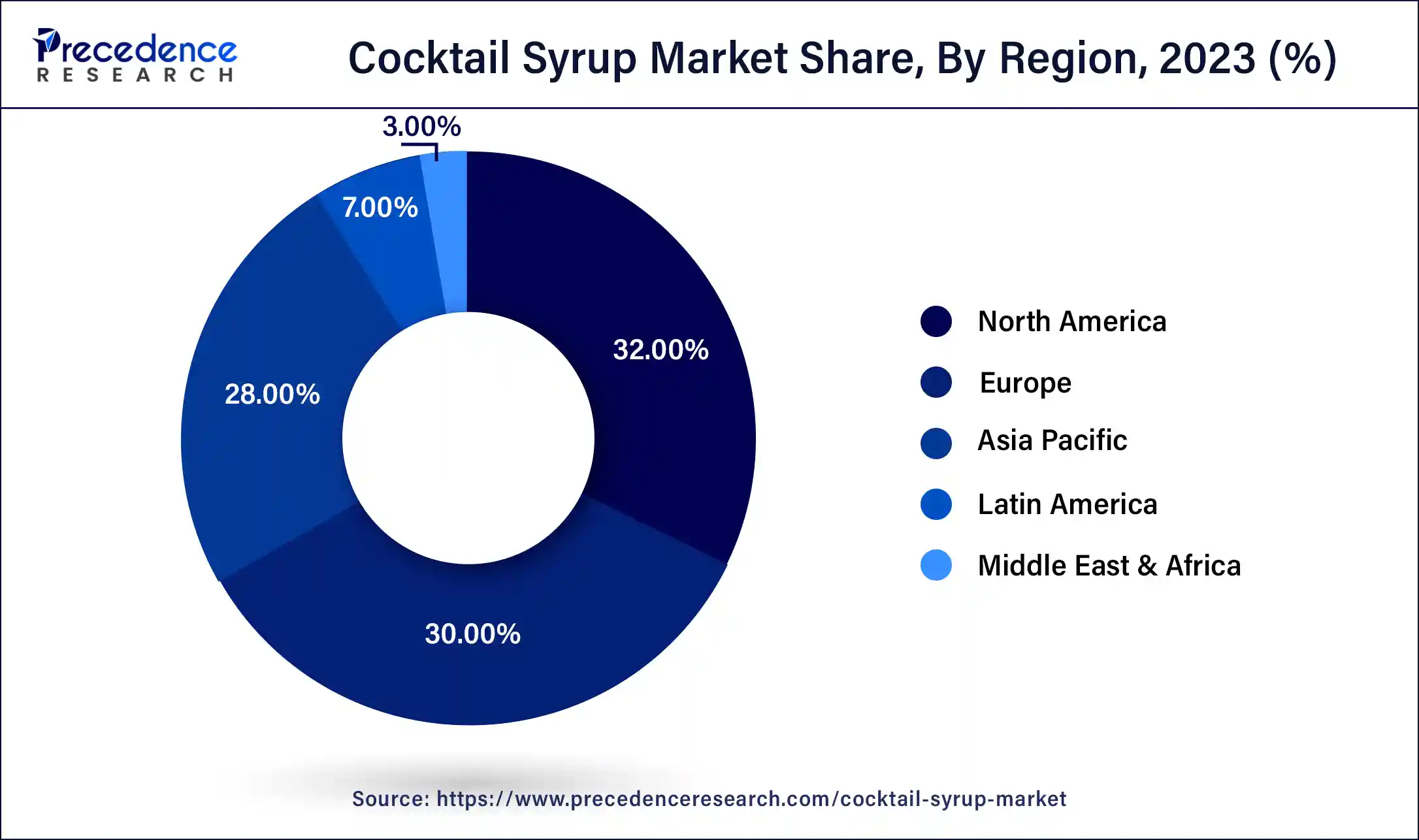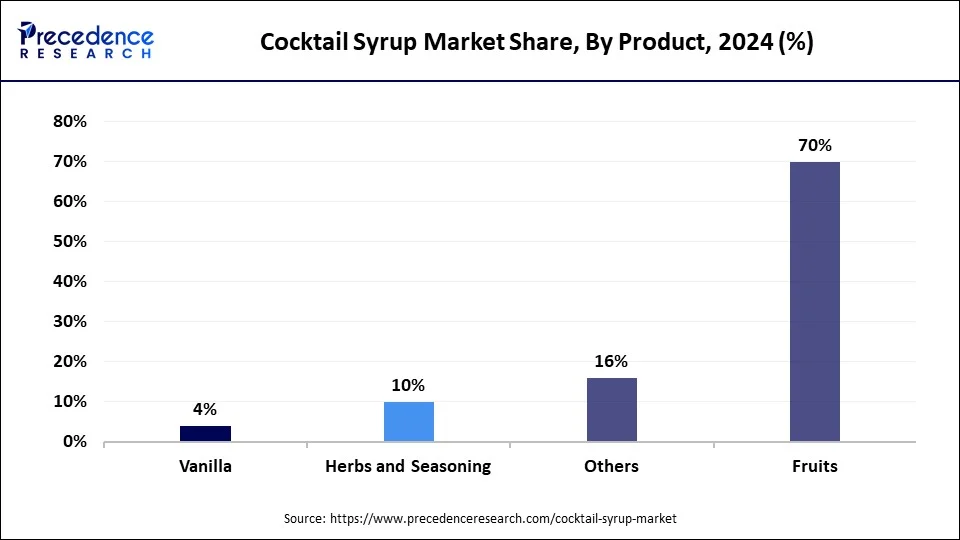November 2024
The global cocktail syrup market size was USD 5.38 billion in 2023, calculated at USD 5.58 billion in 2024 and is projected to surpass around USD 8.01 billion by 2034, expanding at a CAGR of 3.7% from 2024 to 2034.
The global cocktail syrup market size accounted for USD 5.58 billion in 2024 and is expected to be worth around USD 8.01 billion by 2034, at a CAGR of 3.7% from 2024 to 2034. The North America cocktail syrup market size reached USD 1.72 billion in 2023.

The U.S. cocktail syrup market size was estimated at USD 1.21 billion in 2023 and is predicted to be worth around USD 1.84 billion by 2034, at a CAGR of 3.9% from 2024 to 2034.

North America region generated more than 32% of revenue share in 2023 and is growing at an exponential rate. The shifting consumer interest toward flavored alcoholic drinks/beverages is observed to maintain the dominance of North America during the projected timeframe. Additionally, the rising bar and restaurant industry is another major factor to boost the demand for cocktail syrups in the region. Along with this, the increasing popularity of crafting alcoholic beverages is propelling the growth of the cocktail syrup market in the region.
According to the data published by IBIS World in February 2023, the bar and nightclub market in the United States is increasing more rapidly than the food and accommodation services industry in the country. Moreover, the availability of simple cocktail syrups in grocery stores and supermarkets is supplementing the sales of cocktail syrups in North America. Furthermore, changes in consumer spending are driving the growth of the cocktail syrup market in North America.

Some of the major players in the North America cocktail syrup market include Monin Inc., Torani, LLC, The Coca-Cola Company, and Royal Dutch Distillers BV. These companies offer a variety of cocktail syrups, including traditional flavors like simple syrup and grenadine.
Asia Pacific is the fastest growing region for the cocktail syrup market owing to the shifting trend towards the consumption of fancy alcoholic beverages in the younger generation. With a large and growing consumer base, diverse culinary traditions, and a growing interest in natural and sustainable products, the market for cocktail syrups in the Asia Pacific region is expected to continue growing in the coming years.
According to the report published by Economic Times, the sale of alcoholic beverages in India touched a four-year high in 2022; the rising consumption and buying capacity for alcoholic beverages, along with the increasing demand for flavored drinks, are considered to propel the growth of the cocktail syrup market in India.
Europe is another significant marketplace for cocktail syrup; the rising demand for premium and super-premium cocktails and other alcoholic beverages is observed as a significant driving factor for the growth of the cocktail syrup market in Europe. The increasing trend of party culture in European countries is another propelling factor for the development of the cocktail syrup market.
At the same time, emerging economies and rising disposable income are observed as significant factors in boosting the market’s growth in Latin America, the Middle East, and Africa. However, the ban on the consumption of alcoholic beverages in a few Middle Eastern countries hampers the market’s growth.
Cocktail syrups are popular ingredients used in many cocktails and mixed drinks to add sweetness, flavor, and complexity. The cocktail syrup market has been experiencing noticeable growth in recent years due to increasing demand for premium and innovative cocktails in the food and beverage industry.
Consumers are becoming more interested in high-quality, artisanal cocktails made with fresh ingredients and innovative flavor combinations. Additionally, the demand for premium cocktails is driven by a combination of factors, including the rise of the craft cocktail movement and the influence of social media.
A leading alcohol e-commerce delivery company, Drizly, released a consumer trend report in 2022. According to the report, the younger American generation is inclined towards spending on premium alcoholic beverages at casual get-togethers.
Moreover, according to the article published by Beverage Daily in 2021, the population of the United Kingdom continued to treat themselves to premium cocktails and other alcoholic beverages even during the phase of lockdown.
Additionally, the global cocktail syrup industry is considered to achieve significant growth during the forecast period due to rising demand for bartending, improving restaurant culture and rising adoption of party culture by youngsters.
The global cocktail market is growing at an exponential rate due to rising inclination towards fancy and flavored alcoholic beverages, especially in urban areas. Additionally, the rising popularity of cocktails across the globe has surged the demand for cocktail syrup in the global market.
Moreover, as consumers become more health-conscious, there is a growing demand for cocktails made with natural and organic ingredients, which are perceived as healthier and more sustainable. This has led to a rise in demand for high-quality syrups, bitters, and other cocktail ingredients made with natural and organic ingredients.
Organic syrups are typically free of artificial flavors, colours, and preservatives, and are made using sustainable and eco-friendly practices. Considering the demand for organic syrups, several prominent companies shifted their focus towards the production of organically made syrups.
For instance, Organic Simple Syrup by Sonoma Syrup Co., Organic Agave Syrup by B.Good, Royal Rose Organic Lavender-Lemon Syrup and Organic Fiery Ginger Syrup by Liber & Co are organically made syrups, especially designed for cocktails.
Moreover, cocktail syrups can be used in a wide range of cocktails, from classic drinks like the Margarita and Old Fashioned to more unique and innovative concoctions. This versatility is a key factor driving demand for cocktail syrups. Overall, the cocktail syrup market is being driven by a combination of factors, including the popularity of cocktails, flavor innovation, natural and organic ingredients, convenience, and versatility.
| Report Coverage | Details |
| Market Size in 2023 | USD 5.38 Billion |
| Market Size in 2024 | USD 5.58 Billion |
| Market Size by 2034 | USD 8.01 Billion |
| Growth Rate from 2024 to 2034 | CAGR of 3.7% |
| Largest Market | North America |
| Fastest Growing Market | Asia Pacific |
| Base Year | 2023 |
| Forecast Period | 2024 to 2034 |
| Segments Covered | By Product and By Flavor |
| Regions Covered | North America, Europe, Asia-Pacific, Latin America, and Middle East & Africa |
The rising production of innovative flavors in cocktail syrup.
The cocktail syrup market is constantly evolving, with new and unique flavors being developed to cater to consumers' changing tastes and preferences. The flavor innovation in cocktail syrups allows bartenders and mixologists to be more creative and experimental with their drinks, offering consumers a comprehensive range of exciting and unique flavor experiences. This innovation in flavors is driving demand for new and interesting syrups and is a crucial driver of the growth of the market.
For example, in recent years, with the rising demand for fancy alcoholic drinks, the innovation of smokey and fire-flavored cocktail syrups was highlighted. Smoky syrups made with ingredients like smoked salt and mezcal and spicy syrups made with ingredients such as ghost peppers and hot sauce are used to add bold and intense flavors to cocktails.
Rising health concerns.
Most cocktail syrups contain high levels of refined sugar, which can cause a spike in blood sugar levels and lead to health problems such as diabetes, obesity, and heart disease. Cocktail syrups contain empty calories; these calories can quickly add up and contribute to weight gain. Many cocktail syrups contain artificial flavors, colors, and preservatives that can have adverse effects on health over time.
The cocktail syrup is typically high in carbohydrates, which can cause an increase in blood sugar levels and contribute to weight gain. When mixed with alcohol, cocktail syrups can increase the calorie and sugar content of the drink, leading to even more negative health effects. Rising health concerns, along with the hazardous products of cocktail syrups, are observed as a significant restraint for the market’s growth.
Increasing demand for natural and organic cocktail ingredients in cocktails.
Consumers are becoming more health-conscious and are looking for natural and organic ingredients in their food and beverages. Natural and organic cocktail syrups are made with ingredients free from synthetic chemicals and pesticides, which can harm health. As a result, consumers perceive them to be healthier and better for their overall well-being. Natural and organic ingredients are often considered to have a better taste than their synthetic counterparts.
The demand for natural and organic cocktail syrups is driven by consumers who are looking for healthier, more sustainable, and better-tasting products. The rising demand for organic and natural ingredients in cocktails presents an opportunity for cocktail syrup manufacturers to develop natural and organic products that cater to this growing demand.
The fruit segment held the largest share of around 70% in 2023; the segment is expected to maintain its dominance during the forecast period. The interesting taste of fruits flavored syrups and the availability of such syrups has fueled the segment’s growth. The fruit-flavored syrups make the drink more enjoyable by adding a sweet and sour taste. Orange, peach, pomegranate, and litchi flavored syrups have an enormous demand in the global cocktail syrup market. Moreover, the rising preference towards the convenient crafting of alcoholic drinks presents noticeable growth opportunities for the fruit product segment, as fruit syrups allow easy and time-saving crafting of drinks.

The herbs and the seasoning segment is projected to register significant growth during the forecast period owing to the rising demand for organic ingredients in cocktails. Moreover, Herbs and seasoning syrups add unique and complex flavors to cocktails that cannot be achieved through other means. These ingredients can add a depth of flavor that can enhance the overall taste and experience of the cocktail. Certain herbs and seasoning syrups are known to have health benefits, such as anti-inflammatory or antioxidant properties, which can make cocktails healthier and more appealing to health-conscious consumers; rising health concerns are observed to boost the growth of the herbs and seasoning segment.
The sweet flavor segment holds the dominating share of the global cocktail syrup market. The versatility of sweet cocktail syrup is observed as a significant factor in supplementing the segment’s growth. Sweet syrup can be used in a variety of cocktails, from classic drinks like the old-fashioned to newer creations like the Cosmopolitan. This versatility makes it a popular ingredient for mixologists and home bartenders alike.
At the same time, the sour flavor segment is expected to witness significant growth during the forecast period. Sour syrups are known for adding an exciting taste to the cocktail. Sour syrups are widely used in classic drinks like the Margarita and Daiquiri to more creative concoctions. Moreover, sour syrups are becoming popular in the market as they balance the traditional taste of classic cocktails such as whiskey.
Segments Covered in the Report
By Product
By Flavor
By Geography
For inquiries regarding discounts, bulk purchases, or customization requests, please contact us at sales@precedenceresearch.com
No cookie-cutter, only authentic analysis – take the 1st step to become a Precedence Research client
November 2024